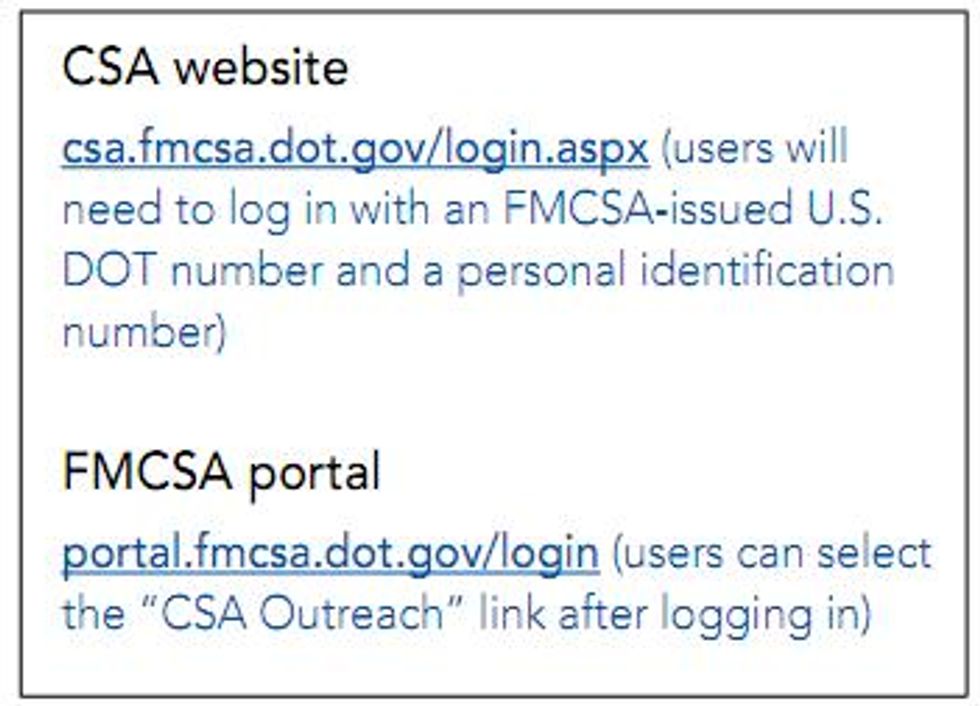Key Ways to Prevent the Most Frequent CSA Violations
Under the Department of Transportation's Compliance Safety Accountability (CSA) program, the Safety Measurement System quantifies the on-road safety performance of carriers and drivers to identify candidates for interventions. The system relies heavily on data from roadside inspections, so every vehicle and driver violation counts. Fortunately, proper maintenance and driver training can prevent nearly all of the most frequent violations private fleets receive.
Minimizing Vehicle Violations
Not only does regular maintenance improve uptime, it can also keep CSA violations at bay.
"Preventive maintenance is the primary means to reduce roadside violations," said Chuck Pagesy director of safety at Penske Truck Leasing.
As part of preventive maintenance, technicians evaluate lights, grease oil leaks, tire tread and fire extinguishers, all of which are frequent violations. Drivers can also monitor these items during daily inspections.
"All of these are nuisance items, but if the driver does a proper pre- and post-inspection, they should catch those little things so when they go through a scale or inspection, there is nothing relevant," Pagesy said.
Of course, things can happen while a driver is out on the road, such as a light bulb burning out. "Nowadays, for the most part, people have gone to LED, and they last a lot longer. They also have diodes, so when a light goes out, it doesn't go out totally," Pagesy said.
Manufacturers are also offering technology that checks circuits and makes sure all of the lights are burning. "It is like a mini pre-trip," he said, adding that some manufacturers now make the feature standard.
Pagesy said drivers need to be good citizens for their organizations. "They must complete their paperwork properly and do their pre- and post-trips. If drivers follow that handful of tips, they won't have any issues," he said.
Frequent Violations

Addressing Driver Violations
Pagesy said many of the most frequent driver violations are easy to control. "A good driver can do just a few minor things to ensure he avoids some of the more common violations," he said, citing wearing a seatbelt and carrying a medical certification card as examples.
Drivers can also avoid violations by obeying driving laws, such as speed limits, traffic lights and stop signs. "These are manageable items that drivers can be trained on and held accountable for good performance," Pagesy said.
Log violations in one form or another make up a good percentage of violations. "If drivers kept their log book current, they could avoid these," he said, adding that electronic logging devices could minimize those types of violations. "In most cases, when they fire the truck up, it will prompt them to enter in information and start their electronic log. It will make sure it is current."
However, drivers are still obligated to make entries into the system. "If they stop that truck for two hours, the truck doesn't know if they are unloading, taking a break or have been in an accident, so they still have to be religious about entering information," Pagesy said.
Dispatchers have a role in minimizing violations by monitoring the drivers' hours of service to ensure they give drivers work assignments that can be legally completed. "They need to monitor and reinforce that it is time to shut down," Pagesy said.
Good communication between dispatchers, supervisors and drivers can reinforce drivers' roles in minimizing violations. "Having daily huddle meetings, frequent handouts or updates on the latest regulations keeps it in the forefront of their minds," he said.
Top Roadside Inspection Vehicle Violations:
- Operating Vehicle Not Having the Required Operable Lamps
- Inspection/Repair and Maintenance Parts and Accessories
- Oil and/or Grease Leak
- Tire-Other Depth Less Than 2/32 of an Inch
- No/Discharged/Unsecured Fire Extinguisher
- Operating a CMV Without Periodic Inspection
- No/Defective Lighting Devices/Reflective Devices/Projected
- Inoperative Turn Signal
- Automatic Brake Adjuster CMV Manufactured on or After 10/20/1994-Air Brake
- Windshield Wipers Inoperative/Defective
- Brake Hose/Tubing Chaffing and/or Kinking
Top Roadside Inspection Driver Violations:
- Log Violation (General/Form and Manner)
- Non-English Speaking Driver
- State/Local Laws − Speeding 6-10 Miles Per Hour Over the Speed Limit
- State/Local Laws - Speeding 11-14 Miles Per Hour Over the Speed Limit
- Driving Beyond Eight-Hour Limit Since the End of the Last Off-Duty or Sleeper Period of At Least 30 Minutes
- Failing to Use Seat Belt While Operating a CMV
- Operating a Property-Carrying Vehicle Without Possessing a Valid Medical Certificate
- Failure to Obey Traffic Control Device
- Driving Beyond 14-Hour Duty Period (Property-Carrying Vehicle)
- False Report of Driver's Record-of-Duty Status Driver's Record-of-Duty Status Not Current
- No Driver's Record-of-Duty Status
- Driver Failing to Retain Previous Seven Days' Logs

 FMCSA will also be renaming the Cargo-Related BASIC to the Hazardous Materials (HM) BASIC, which will better identify HM-related safety problems and change how HAZMAT carriers are classified to allow for increased intervention scrutiny. Now HAZMAT violations will be placed in the HAZMAT BASIC, which will better identify HAZMAT-related safety problems and change how HAZMAT carriers are classified to allow for increased intervention scrutiny. The HAZMAT BASIC will include items such as placarding and paperwork violations.
FMCSA will also be renaming the Cargo-Related BASIC to the Hazardous Materials (HM) BASIC, which will better identify HM-related safety problems and change how HAZMAT carriers are classified to allow for increased intervention scrutiny. Now HAZMAT violations will be placed in the HAZMAT BASIC, which will better identify HAZMAT-related safety problems and change how HAZMAT carriers are classified to allow for increased intervention scrutiny. The HAZMAT BASIC will include items such as placarding and paperwork violations.